Guppies feature various types of tails, which are beautiful, colorful, and attractive. Meanwhile, guppies are easy to keep and breed. Unfortunately, pintail disease is the main cause of guppy fry death. Once your guppy suffers from pintail disease, its caudal fin will shrink together, and then the caudal fin will gradually turn from fan-shaped into needle-shaped. In this article, let’s learn more about guppy pintail disease, including causes, symptoms, and treatments.
Content Table
What Causes Pintail Disease in Guppies?
In the first place, we will provide some causes of guppy pintail disease. Next, we can seek solutions to cure. The pathogenesis is a parasite, rather than a germ. The parasite is named gyrodactylus, which is hermaphrodite. And there are small embryos in large embryos. Besides, gyrodactylus is parasitized on fish’s surface and gills. It stimulates fish to secrete mucus, forming a level of dull mucous film on the skin. The gyrodactylus relies on mucus to survive, but the mucous film is harmful to fish.
When there is a small amount of gyrodactylus, fish can swim quickly to get rid of it. Seeing that young fry, small fish, or old fish can not swim quickly, thus, pintail disease is more common among them.
Aside from that, there are other reasons leading to pintail disease. To begin with, poor water quality may cause pintail disease. Secondly, overstock is another reason. The limited room makes guppies get pintail disease easily. Thirdly, too many nitrifying bacteria may also lead to pintail disease. While nitrifying bacteria can make guppies grow comfortably, too many nitrifying bacteria provide the possibility for bacteria to attach easily. Moreover, guppies’ caudal tails are closed because of the sudden change in water temperature. So you should keep the water temp at about 25℃.
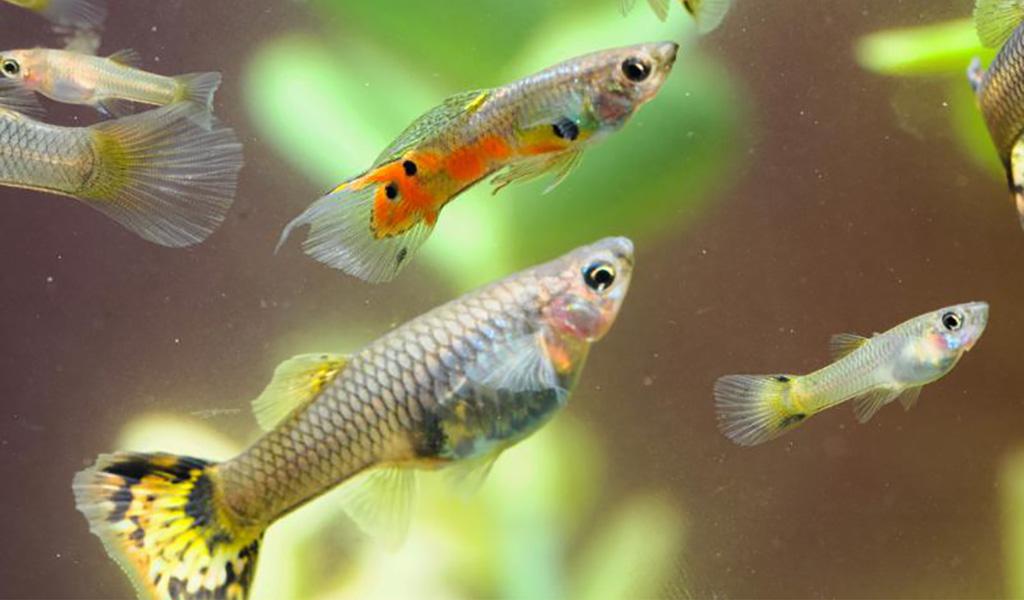
Is Guppy Pintail Disease Contagious?
Although all guppies in your tank are suffered from guppy pintail disease, the disease still may not be contagious. Once one guppy in your tank is infected, others may suffer the pintail disease quickly. It is the result of gyrodactylus reproduction. Because the gyrodactylus can reproduce quickly within 24 hours, and the newborn gyrodactylus may parasitize on other guppies. And they will get pintail disease in the end. In a word, the guppy pintail disease is not contagious, nonetheless, the gyrodactylus can breed and spread quickly on other fish.
For example, assuming that there is only one gyrodactylus in the water, and it will not reproduce itself, then it is parasitic on the small guppy fry A, and then the host A suffers from pintail disease; If this gyrodactylus is transferred from the small guppy fry A to the small guppy fry B, then the host B suffers from pintail disease, and the small guppy fry A is no longer the host.
However, pay attention that after the gyrodactylus is transferred to the small guppy fry B, the small guppy fry A has no gyrodactylus on it, so there is no pintail disease trouble, then fish A can be restored. Gyrodactylus can reproduce itself, so small guppies in one tank have suffered from pintail disease after being parasitized.
That’s why it is recommended to isolate the pintail guppy to another tank.
Appearance Changes in Pintail Guppy
Such being the case, can we determine from guppies’ appearance changes whether they suffer from pintail disease or not? We can! Once infected with pintail disease, guppy fish will not swim actively in the water, and then become a loss of appetite and weight, breath with difficulty, and even die. You can see obviously that the caudal fin shrinks, and the angle becomes significantly smaller. In the beginning, the tails are shaped like squares. They do not like to swim around and swim uncommonly. On the contrary, in the final stage, their tails shrink, like a pin. And they prefer lying in the corner.
Pintail Guppy Disease Treatment
Dear friends, until now, we have known the causes and symptoms of guppy pintail disease, nonetheless, can we take action to prevent the pintail disease? Exactly yes! In this segment, we will provide some preventive actions and treatments.
Preventive action
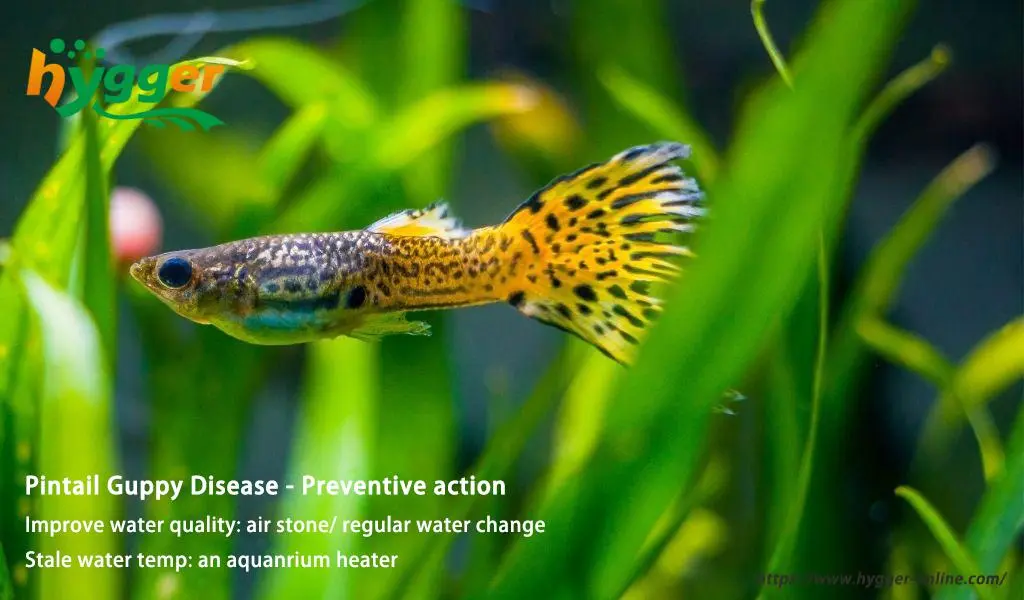
- Do not overstock
Overstock will cause pintail disease. Too much fish may lead to poor water quality, which is one potential reason for guppy pintail disease. To keep great water quality, you can add an airstone. It can oxygenate your tank as well as agitate the water. Meanwhile, an air pump can oxygenate the water and expel excess carbon dioxide, while an aquarium filter can remove excess waste and toxic substances. Thus, an air pump or a fish tank filter can also play an important role in keeping great water quality. On the other hand, you should keep regular water changes. But you should be careful about the frequency and volume of water change.
Once a week, changing one-third of the water is an excellent option. Besides that, an aquarium gravel cleaner can give you a hand. It can suck away aquarium dirty water and clean the gravel, and you can also install a duck-billed suction head to clean fish tank feces. Another thing, it can change water quickly. With the pressure from the water, the gravel and sand can be sucked up into the gravel tube, and the debris in the gravel will be vacuumed out.
- Stable water temperature
Fluctuation of water temp poses a threat to guppies. The temperature difference should not exceed 1 ℃. You can apply an aquarium heater to keep stable water temp. Meanwhile, a 200W aquarium water heater with a thermometer would be perfect for the 20-40 gallon guppy tank. Since you can check real-time water temperature, and adjust in time. A smart aquarium heater can automatically heat when the water temperature is 0.5-1℉ lower than the set temp. Furthermore, when you’re doing water changes, you should pay attention to the water temperature of the original tank and the new water. Also, you should test the new water with an aquarium water test kit before adding it.
Feasible treatments
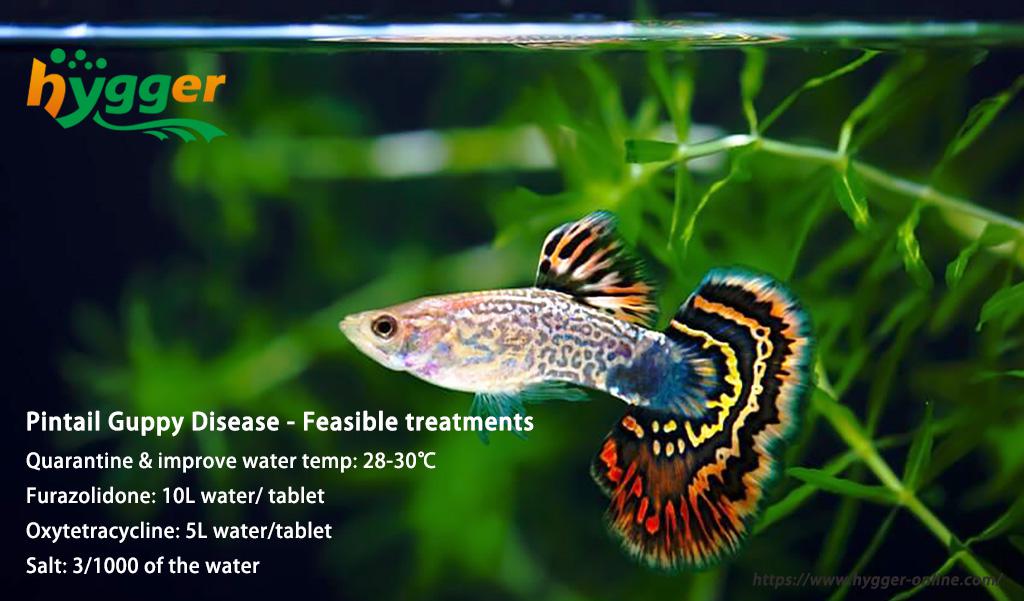
- Quarantine and improve water temp
If gyrodactylus does not parasitize in the guppy, it can only live for about 3–4 hours, up to 7 hours. As a result, if one guppy suffers from pintail disease, you can remove it and quarantine it in another tank. Accordingly, you should improve the water temperature of the quarantined aquarium, and 28-30 ℃ is suitable. Meanwhile, make the quarantined aquarium basking. By doing so, the gyrodactylus may leave away from the guppy. In addition to this, you can also add potassium permanganate for one week.
- Clean your fish tank
Too many nitrifying bacteria may also lead to pintail disease. In this case, you can clean your fish tank, and then add penicillin or furazolidone to provide a medicinal bath for infected guppies. It is recommended that 10 liters of water for one tablet of furazolidone. You should keep the bath once each day for about 15 minutes. And you should keep seven consecutive days. Meanwhile, you should not feed your fish during this period.
- Add oxytetracycline or salt
You can use 1–2 tablets of oxytetracycline to treat the infected guppy. You should follow that 5 liters of water for one tablet of oxytetracycline. In addition to this, adding salt is another effective choice. The amount should be three-thousandths of the water. However, it is better not to add all at one time, on the contrary, three times are great. It will avoid guppy death due to the sudden rise of salinity in the water. In the initial period, you should keep bathing sick guppy for about 2–3 days. Latterly, you can keep bathing until their tails spread. One tip here! When you bathe the sick guppy with salt, you should not add other medicine.
Summary
In summary, provided that there is one guppy gaining pintail disease, you should take action as soon as possible, or all the guppies in your aquarium may suffer from pintail disease, or even die. Once you notice one guppy is infected, you can remove it from the tank, and isolate it in another aquarium. Other treatments mentioned above are also feasible, either.
After reading, can you deal with guppy pintail disease? Attention please, this article may not be exhaustive. Consequently, if anything is missed, do not hesitate to tell us. You can leave your ideas in the comment or contact us. Finally, thanks for your reading!
Relevant topic: How Many Guppies in a 10 Gallon Tank
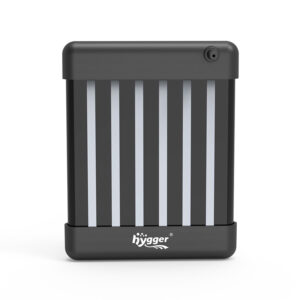
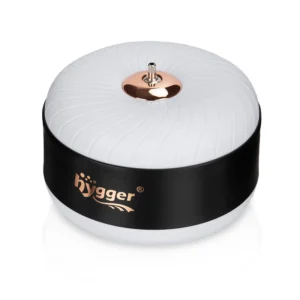
Leave a comment